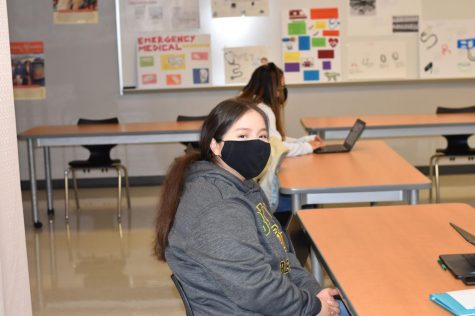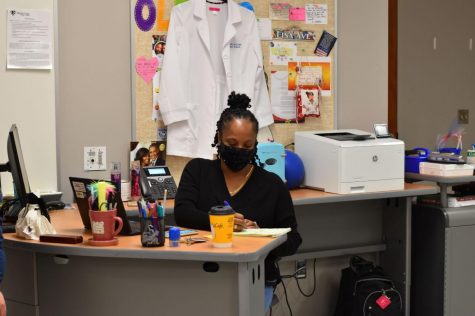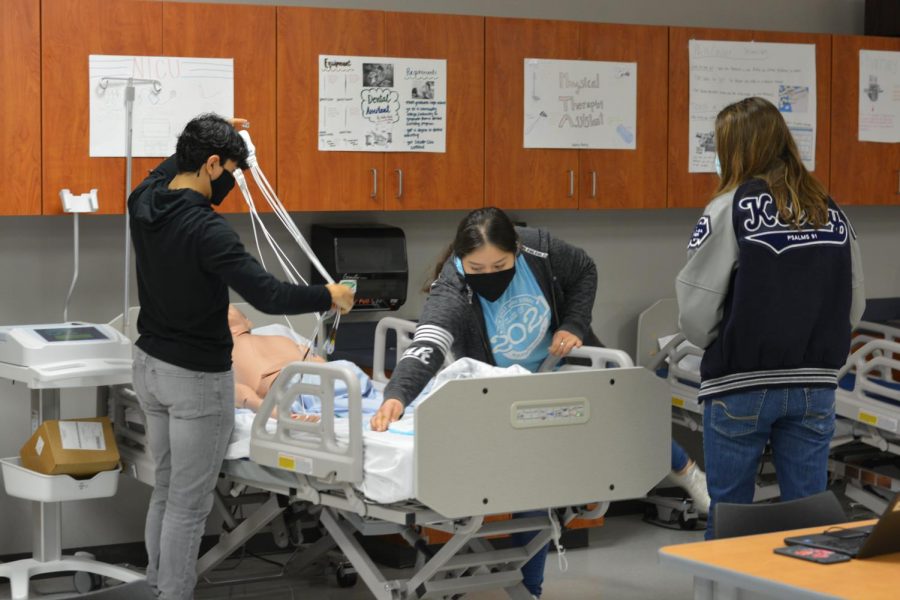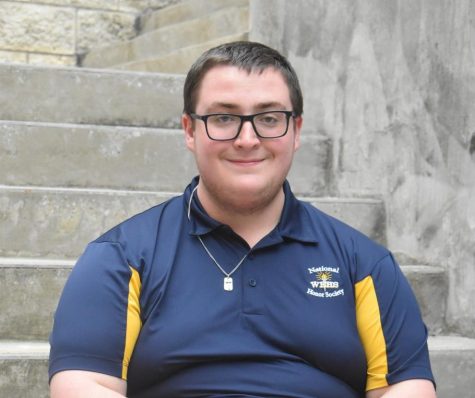So says the heart
Students learn how to do an EKG in new class
photo credit: Isabel Zambrana
Heartfelt Future // Practicing their lead placement for their EKG, senior Nancy Gomez, and other students prepare for their health care careers. “I am really outgoing with people so working with different patients and people is interesting to me. I am planning to be a sonographer or an ultrasound tech,” Gomez said.
May 12, 2021

Students learn about the EKG // Preparing for her EKG practicum class, senior Nancy Gomez studies the electrocardiogram process in Mrs. Olford’s new class. “First of all, it seemed really interesting to me because learning about the irregularities of the heart and different irregular rhythms seemed very interesting to me,” Gomez said.

All Heart \\ Health science teacher Lisa Olford plans her next EKG practicum class, where she teaches students how to arrange the machine. “I really think that the EKG practicum, whether they go on to be an EMT, PCT, any medical program they will be dealing with patients and people that knowing how to read EKGs, knowing quickly if something is wrong with a patient is going to help further their healthcare careers,” Olford said.
“I was asked to take the role of EKG,” health science teacher Lisa Olford said. “I feel like if students want to get into the medical field, knowing how to read an EKG and how to be professional with patients is very important and so I did not mind teaching this class.“
An electrocardiogram (EKG) records the electrical signal from the heart to check for certain heart conditions. Electrodes are placed on the chest to record the heart’s electrical signals, which cause the heart to beat
“I know a lot about it, for one thing,” Olford said “Coming from a military and ICU ER background. I enjoy teaching it and hope they can take what I teach them and go forward into their healthcare career. “
This is the first year of the EKG practicum, and the class only has a few students.
“First of all, it seemed really interesting to me because learning about the irregularities of the heart and different irregular rhythms seemed very interesting to me,” senior Nancy Gomez said. “Also different types of diseases and what could cause bad heart rhythms interest me.”
The students go on to take a certification test to become EKG certified, which could help in their college and hospital search.
“They are going to have to know how to do EKGs and how to count the heartbeat from looking at an EKG strip and those are things they are learning now in this class,” Olford said. “So when they do get to college, and it is also part of the healthcare program, even if it is nursing or a doctorate program, they have to know EKGs for their programs so it will help them out a lot.“
To take the certification test, the students have to do at least 10 live EKGs on teachers.
“The teachers come in, the students put the leads on the teachers,” Olford said. “The students call me over, I make sure they are in the correct place and then they’ll run the EKG.”
This year, the class can only have teachers volunteer to have students practice their EKG on them.
“If people are planning to take EKG I think it is one of the most interesting classes,” Gomez said. “You get to do a lot here and get to identify any disturbances in the heart.”
Some hospitals have an EKG strip test as a part of their application process.
“This will give them a heads up on everything that they are going to need to know going into their healthcare field,” Olford said. “I wish I had this in high school, because going to my nursing school program, I had to learn it then instead of already having some idea of it. I absolutely think it is a great program that they have here.”
Next year, with parental permission and a consent form, students could also have an EKG done.
“This year, due to COVID, all we can do is use teachers but hopefully, in the future, we can get people that have had their background checked to come in and we can have more of a variety of different patients,” Olford said. “I really think that the EKG practicum, whether they go on to be an EMT, PCT, any medical program they will be dealing with patients and people that know how to read EKGs, knowing quickly if something is wrong with a patient is going to help further their healthcare careers.”



